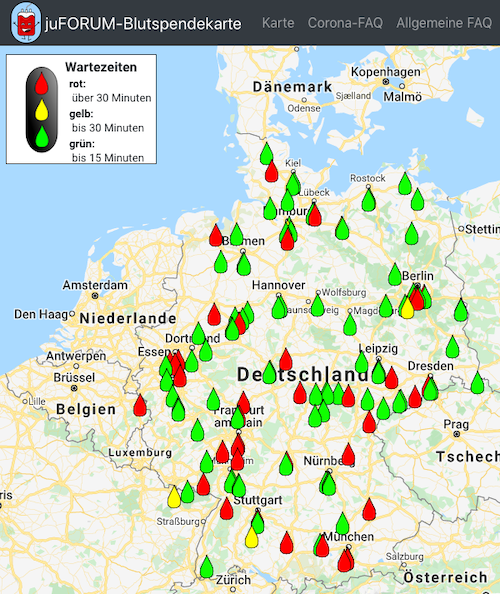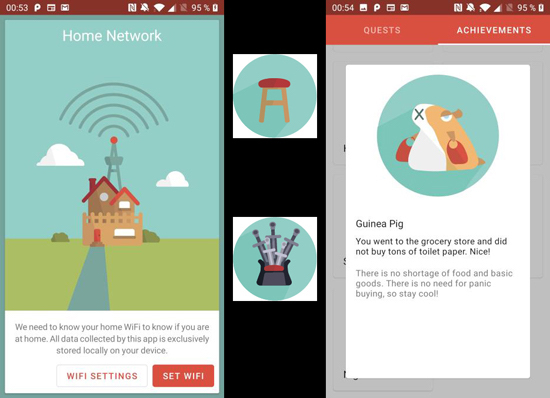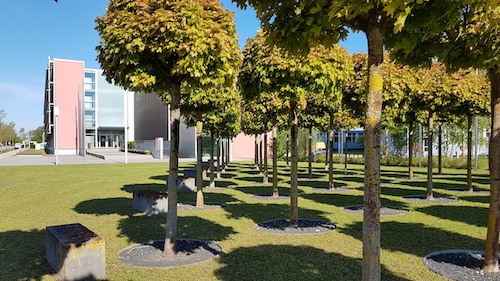LRZ-Newsletter Nr 5/2020 of May 7, 2020

Our Topics:
- News
- Workshops and Events
- Job Opportunities
- More to Read
- Informations about the LRZ-Newsletter
- Imprint
News
Vocational Training at Home
 Learning
and working at home:
The five trainees at the Leibniz
Supercomputing Centre (LRZ) have been working and learning at home
since 20
March. The vocational school is also digital. The future systems
electronics engineer Markus has set up a "small but nice home office"
for this purpose and finds virtual learning "nice for a change but also
a
challenge: Whether it is better or worse, I can't say", he says. "But
as time goes by, I'm starting to miss my colleagues and the personal
interaction."
Learning
and working at home:
The five trainees at the Leibniz
Supercomputing Centre (LRZ) have been working and learning at home
since 20
March. The vocational school is also digital. The future systems
electronics engineer Markus has set up a "small but nice home office"
for this purpose and finds virtual learning "nice for a change but also
a
challenge: Whether it is better or worse, I can't say", he says. "But
as time goes by, I'm starting to miss my colleagues and the personal
interaction."
The practical work at LRZ customers has decreased, instead the trainees learn online and via video streaming at home. In return, they regularly receive reading and learning material from their supervisors. This comes in the form of moodle questionnaires and is repeated and discussed in video conferences. The workload is challenging: "The 'Linux' module was completely converted to the virtual services of the LRZ and was successfully completed by all of them over the last two weeks, four hours a day each," reports training coordinator Petra Gärtner. They use chat communication and phone calls to clear up potential misunderstandings.
The vocational school is also closed: "We were given worksheets to work through," says Björn, who's learning theory and practice to become IT specialist system integration at the LRZ: "I learn better in the home office, I don't have to get up so early and I can sleep longer. However, I find it easier to be distracted by other things at home". Although they can now assign tasks to themselves, the trainees miss their colleagues and diverse tasks their jobs usually offer. They are really looking forward to practical work on networks and computers once the initial restrictions have been lifted: "I can do little practical work at home, but I program and document more now," reports Markus. "Just sitting in front of the screen is quite unusual and exhausting for me, so I often have to motivate myself to keep going. Breaks help, sports, going out, also music or a chat with friends. (vs)
Developing Solutions for the Crisis Together
 43,000
registrations, 28,000
participants, almost 1,500 ideas around
the corona crisis: During the hackathon #WirVsVirus,
initiated by the German government and companies from the start-up
environment, apps, websites and technology were created to solve a wide
variety of corona problems. Elisabeth Mayer, software developer and
graphics specialist from the Centre for Virtual Reality and
Visualisation (V2C) at the Leibniz Supercomputing Centre (LRZ), and
Daniëlle
Schuman, computer science student at the LMU and and employee in LRZ IT
service management, were also involved. She and her team developed a website on
donating blood: "This is important even in times of corona, but
because of the risk of infection you should come at times when there
are not many people there," explains Daniëlle. The website shows
facilities for donating blood and is soon to use a traffic light system
to indicate when they are frequented and how much. The team is looking
for help to complete its site more quickly. Elisabeth Mayer has
contributed her graphic experience to two projects: She developed
symbols and icons for the "Stay Home" app, which motivates people to
stay at home. In addition, she designed the look of "Fakti", an
automated fact-checker for the messenger service Telegram. More about
the Hackathon and the two projects on the LRZ homepage:
https://www.lrz.de/presse/ereignisse/2020-04-16_WirVsVirus/
(vs)
43,000
registrations, 28,000
participants, almost 1,500 ideas around
the corona crisis: During the hackathon #WirVsVirus,
initiated by the German government and companies from the start-up
environment, apps, websites and technology were created to solve a wide
variety of corona problems. Elisabeth Mayer, software developer and
graphics specialist from the Centre for Virtual Reality and
Visualisation (V2C) at the Leibniz Supercomputing Centre (LRZ), and
Daniëlle
Schuman, computer science student at the LMU and and employee in LRZ IT
service management, were also involved. She and her team developed a website on
donating blood: "This is important even in times of corona, but
because of the risk of infection you should come at times when there
are not many people there," explains Daniëlle. The website shows
facilities for donating blood and is soon to use a traffic light system
to indicate when they are frequented and how much. The team is looking
for help to complete its site more quickly. Elisabeth Mayer has
contributed her graphic experience to two projects: She developed
symbols and icons for the "Stay Home" app, which motivates people to
stay at home. In addition, she designed the look of "Fakti", an
automated fact-checker for the messenger service Telegram. More about
the Hackathon and the two projects on the LRZ homepage:
https://www.lrz.de/presse/ereignisse/2020-04-16_WirVsVirus/
(vs)
Find Active Compounds Against Corona
 Another
contribution to the
corona pandemic: The SuperMUC-NG of the Leibniz Supercomputing Centre
(LRZ)
is combing millions of chemical and organic substances for active
substances against the SARS CoV-2 virus for two European research
projects. The use of supercomputers can shorten the development time of
drugs. Laboratories often need years to find new active substances that
can bind to the virus and inhibit its replication. Supercomputers
analyse millions of substances in a few days and calculate their
interaction with viruses. At the Gauss Centre for Supercomputing (GCS), the
British chemist and computer scientist Peter Coveney and his partners have applied for
rapid access to the SuperMUC-NG. In analysing the binding of active
substances (ligands) to the proteins of the virus (receptors), they are
guided by the energy released in the process. Rule of thumb: The more
energy is released, the stronger the bond - and possibly also the
effect on the components of the virus. They have applied for 10 million
core hours on the SuperMUC-NG via the GCS Fast Track.
Another
contribution to the
corona pandemic: The SuperMUC-NG of the Leibniz Supercomputing Centre
(LRZ)
is combing millions of chemical and organic substances for active
substances against the SARS CoV-2 virus for two European research
projects. The use of supercomputers can shorten the development time of
drugs. Laboratories often need years to find new active substances that
can bind to the virus and inhibit its replication. Supercomputers
analyse millions of substances in a few days and calculate their
interaction with viruses. At the Gauss Centre for Supercomputing (GCS), the
British chemist and computer scientist Peter Coveney and his partners have applied for
rapid access to the SuperMUC-NG. In analysing the binding of active
substances (ligands) to the proteins of the virus (receptors), they are
guided by the energy released in the process. Rule of thumb: The more
energy is released, the stronger the bond - and possibly also the
effect on the components of the virus. They have applied for 10 million
core hours on the SuperMUC-NG via the GCS Fast Track.
The project by Daniel Soler Viladrich of the University of Barcelona, for which an application for computing time at the SuperMUC-NG was submitted via Partnership for Advances Computing in Europe (PRACE), is different: It is significantly smaller and requires only four million core hours. The biochemist is also looking for substances that prevent the virus from attacking cells. Viladrich and his team combine laboratory experiments with supercomputing and have developed a scoring system based on a wide range of criteria. SuperMUC-NG uses this scoring system to filter out substances that potentially bind to and block the proteins of various corona strains. The effectiveness of these compounds is then tested experimentally. (vs)
"A Good Firewall is a Start"
 Work
and study from home: When
many people access the systems,
programs or documents of universities, research institutions or the
Leibniz Supercomputing Center (LRZ) from home, the risks of data loss
or attacks
on storage and systems increase. As Chief Information Security Officer
(CISO), Stefan Metzger is responsible for ensuring that all services of
the LRZ function reliably and that the data of customers and users are
protected in normal and crisis situations, such as the current corona
pandemic. A conversation about caution, responsibility and data
security.
Work
and study from home: When
many people access the systems,
programs or documents of universities, research institutions or the
Leibniz Supercomputing Center (LRZ) from home, the risks of data loss
or attacks
on storage and systems increase. As Chief Information Security Officer
(CISO), Stefan Metzger is responsible for ensuring that all services of
the LRZ function reliably and that the data of customers and users are
protected in normal and crisis situations, such as the current corona
pandemic. A conversation about caution, responsibility and data
security.
According to the German government, the number of hacker attacks on research institutions has almost tripled in 2019 compared to the previous year. Is this also noticeable in the systems of the Leibniz Supercopmputing Centre?
Stefan Metzger: We have also noticed a continuous increase in attacks on IT systems in the Munich Scientific Network (MWN) in recent years, but currently and due to the corona pandemic no particular conspicuousness. Nevertheless and especially now, the issue of security is becoming very important. Instead of the danger of successful hacker attacks, however, I can imagine that home offices and digital courses will create many more problems in the area of data protection and data security that many of our users and colleagues do not even think about. Files and data can be better secured in the home office or during remote study by means of a few technical measures, and I think we all need to become much more sensitive when it comes to data protection.
The conference tool Zoom is controversial because video conferencing data is not secure. Nevertheless, like many other universities, the Munich-based company is relying on it.
Metzger: Universities work with Zoom or Microsoft teams because it allows several hundred people to attend a course very easily. These commercial providers can easily and flexibly adapt the necessary machines and resources to actual needs, which is a significant difference to publicly funded, scientific data centers or university institutions. However, when using Zoom or Teams, data related to a videoconference is transmitted on their servers. In the case of lectures, the content of which is largely accessible to the public anyway, e.g. through scripts linked on the website, there is initially no security problem with regard to the confidentiality of this data. Zoom and Teams also offer settings that allow conference participants and organizers to better protect privacy. For example, they can deactivate the camera and microphone when entering a conference so that calls that are still in progress, such as a telephone call in the home office, are not made available to third parties via the conference, or they can choose a different background if they do not want to give an insight into their private rooms. With the help of conference passwords, the use of dedicated client software and the necessary authentication, organizers can determine very precisely who is participating in their event.
Zoom, Microsoft Teams, DFNconf, Jitsi or Meet.LRZ, NextcloudTalk, GoToMeeting, Blizz - the LRZ also hosts a number of programs that allow me to learn or work with others via video. Which one is secure?
Metzger: From a technical point of view, all of them certainly offer good transmission. From a security point of view, the purpose and content of the conference and the number of participants are important when using a tool. If the conferences are about final exams, interviews on sensitive topics or exchange of confidential project information, we recommend the use of tools from the German Research Network or from Jitsi, i.e. Meet.LRZ, which is hosted at the LRZ. The resulting data will be stored on our servers and thus meet the Bavarian and European data protection regulations. The Friedrich-Alexander-University of Erlangencompares the most important conference tools used in the university environment, which are suitable for teaching as well as simple conference meetings. Facebook, WhatsApp, Google, Skype or Zoom in their respective free versions are more worrisome for business purposes, as access data is processed and evaluated for advertising here.
Is it actually possible to take exams or tests digitally?
Metzger: Yes. We have already received inquiries from the universities. With the existing offers of the LRZ, digital examinations are technically quite feasible, but currently require additional organisational measures. How can it be prevented, for example, that students access teaching material or the Internet at home without permission during an examination in order to answer questions? For written examinations, documents must be delivered in such a way that everyone can access them at the same time. But how to deal with unexpected disconnection if a student's Internet connection is poor? Solutions to such questions must be developed in cooperation with lecturers and experts, but they take time. This semester, exams will probably still require supervision and presence.
Working and studying remotely also means accessing the servers and data storage of the LRZ or the universities from a distance - how do I secure the connection?
Metzger: A firewall on the computer, at home or in the institutes, and constantly updated browsers and software are a good start. Unfortunately, you often need several browsers or dedicated client software because conference systems or other services only work well with them. Mails with attachments can also be encrypted, LRZ Sync+Share offers a more secure and comfortable way to exchange files. The Munich Scientific Network is a rather open network for good reasons. Scan attacks can be observed here regularly, spying out security holes, such as open connections to participating servers or institutions. Therefore the LRZ offers firewalls and secure Virtual Private Networks for chairs and institutes, which create a secure connection to documents or offers for users from outside like in a tunnel. These networks in the network simply work with a personal identification and password. What is certain, however, is that most risks on the Internet are not caused by hackers, but by user errors, or better: by carelessness and excessive reliance. (vs)
Experiment Distance Learning
 The
systems have withstood the
onslaught: The specialists for the
basic, video and web services at the Leibniz Supercomputimng Centre
(LRZ) were
particularly busy on 20 April. The summer semester started digitally at
the Munich universities, and since then the systems at the LRZ have
continued to be under particularly high load. Lectures are now streamed
online, seminars are held remotely: "Up until five weeks
ago, we did not give much thought to distance learning, we just talked
about recording parts of lectures from time to time," admits Dieter
Kranzlmüller, Professor of Computer Science at
Ludwig-Maximilians-Universität Munich (LMU) and head of the Leibniz
Supercomputing Centre. "Now we have
to try out other solutions in this emergency situation, that will be
exciting."
The
systems have withstood the
onslaught: The specialists for the
basic, video and web services at the Leibniz Supercomputimng Centre
(LRZ) were
particularly busy on 20 April. The summer semester started digitally at
the Munich universities, and since then the systems at the LRZ have
continued to be under particularly high load. Lectures are now streamed
online, seminars are held remotely: "Up until five weeks
ago, we did not give much thought to distance learning, we just talked
about recording parts of lectures from time to time," admits Dieter
Kranzlmüller, Professor of Computer Science at
Ludwig-Maximilians-Universität Munich (LMU) and head of the Leibniz
Supercomputing Centre. "Now we have
to try out other solutions in this emergency situation, that will be
exciting."
Downgrade Resolution and Save Bandwidth
Together with his colleague Manuela Pietraß, Manuela Pietraß, Professor of Educational Science at the Universität der Bundeswehr München, Kranzlmüller has been thinking about how teaching could function digitally, both pedagogically and technically: "When an event is streamed, non-verbal information is lost, which requires increased concentration to follow it on screen," explains Pietraß and recommends lecturers: "It is important to use as few communication channels as possible: Is sound enough? Is sound and an offline PC sufficient? Is sound and an online-split screen enough? Can a video conference replace the face-to-face meeting? However, whether the experiment of distance learning will actually succeed is also a question of the bandwidth available to lecturers and students on a small budget: "Within the Munich Scientific Network we at the LRZ do not experience any problems", Kranzlmüller says. "We even transmit data from the Large Hadron Collider CERN. But for a video conference the capacities of a cheap internet connections at home are often not sufficient". This is especially the case when roommates or family also use the Internet parallel to lectures or seminars, streaming films or studying. If users reduce the quality of the transmissions, the capacity utilization decreases. Conversely, lecturers save bandwidth if they dispense with communication channels when teaching - in many cases, sound plus the split screen for presentations is sufficient to convey content.
Lecture in Bite-Sized Pieces
With video conferencing systems such as Jitsi, DFNConf, Zoom, teaching material is now being taught, and at the LMU Moodle helps with explanations and personal contact. Since 24 April Kranzlmüller has been lecturing on "Computer networks and distributed systems". Normally the lecture lasts three hours, every Friday morning. "It makes no sense to stream a lecture for that long," says the computer science professor. Together with his team at the chair, he has therefore divided the material into short blocks of information and now comments on 20 to 30 minutes of presentation slides in a video podcast. "More important than video podcast, however, is the possibility for the students to ask questions and give feedback." This is the part of the lecture where Moodle comes into play.
The first parts of his lecture have already been mastered. After the exams Kranzlmüller wants to find out how digital teaching is being received and whether it could one day replace personal lectures. If the exams turn out better than before, this would support changing to more digital ways of learning. Lecturers would then be able to devote more time to students and doctoral candidates in their free time. "I hope we will return to the personal lecture", says Kranzlmüller. "I enjoy standing in the lecture hall. That's the nice thing about being a professor, the interaction with students and listeners gives me a lot, because they ask good questions and this gives me ideas that I haven't even had yet. (vs)
Simulating and Controlling Quantum Technology
Quantum computers are considered promising, powerful alternatives to traditional supercomputers. They are not yet mature enough for producing meaningful scientific results, but while waiting for hardware improvements, simulations help. This is the focus of QuantEx, a research project of the Partnership for Advanced Computing in Europe (PRACE), in which the Leibniz Supercomputing Centre (LRZ) is cooperating with the Irish Centre for High-End Computing (ICHEC). "The aim is to develop tools for the simulation of quantum circuits", explains Luigi Iapichino, team lead of quantum computing at LRZ. "Simulations help write and debug programs for quantum computers, without having them available."
SuperMUC-NG as a test platform
QuantEx stands for "Efficient Quantum Circuit Simulation on Exascale Systems" and is part of the program to develop "Future-oriented Software Solutions". The project started in January 2020 and will run until the end of 2021. It will require (among other test systems) the computing power of SuperMUC-NG, currently the fastest supercomputer in the EU, which will be used to test and optimise the tools and algorithms being developed by the QuantEx team. Quantum computers make use of fundamental quantum mechanical effects like superposition and entanglement, which are extremely short-lived and difficult to control for macroscopic systems made up of many qubits. Combining qubits and being capable of coherent control can result in exponentially increasing compute power: "This increases the computing and memory requirements as well, if we want to simulate quantum states of an increasing number of qubits," Iapichino points out.
Optimise Use of Storage Power
Quantum technology is just emerging from its infancy: Whereas experiments were previously limited to systems with only a handful of qubits, the first Noisy Intermediate Scale Quantum Systems (NISQ) are now emerging, which feature around 50 qubits. Even the world’s largest supercomputers really struggle to fit the quantum states required to simulate such systems in memory. QuantEx is therefore characterising tools that require less compute and storage capacity but can still simulate the operation of NISQ devices. Tensor network contractions, mathematical methods developed by quantum physicists for evaluating systems of interacting particles, help here. For example, SuperMUC-NG can store in memory the full quantum state of a system with 42 qubits but with the same memory could simulate up to about 100 qubits for certain circuits thanks to tensor contraction networks. (vs)
Figures of the Month
 The
LRZ Compute Cloud offers a storage
capacity of 1,929
Pebibyte (equivalent to about 2,171860920299 Petabyte) and has
more than 120 servers providing virtual servers for
users. More than 5400 CPU cores and 40
terabytes of random access memory or RAM are available for
test environments, simulations, services and all kinds of other
services that users install and operate for themselves or project
partners. However, the resources are not only used by external users,
the LRZ itself offers services that make use of cloud resources. The
number of servers in the publicly usable part of the Compute Cloud "has
just shrunk a little because we have reserved 8 servers
to support the video and telephone conference system of the German
Research Network", explains Niels Fallenbeck of the LRZ cloud team. The
cloud is currently very much in demand: Memory, CPU and GPU are almost
fully utilized with values of well over 90%. Anyone who applies for
access to the LRZ cloud can create virtual servers and infrastructures
in it after just a few minutes.
The
LRZ Compute Cloud offers a storage
capacity of 1,929
Pebibyte (equivalent to about 2,171860920299 Petabyte) and has
more than 120 servers providing virtual servers for
users. More than 5400 CPU cores and 40
terabytes of random access memory or RAM are available for
test environments, simulations, services and all kinds of other
services that users install and operate for themselves or project
partners. However, the resources are not only used by external users,
the LRZ itself offers services that make use of cloud resources. The
number of servers in the publicly usable part of the Compute Cloud "has
just shrunk a little because we have reserved 8 servers
to support the video and telephone conference system of the German
Research Network", explains Niels Fallenbeck of the LRZ cloud team. The
cloud is currently very much in demand: Memory, CPU and GPU are almost
fully utilized with values of well over 90%. Anyone who applies for
access to the LRZ cloud can create virtual servers and infrastructures
in it after just a few minutes.
The LRZ in the Media
 For
readers who want to find out
more about the Leibniz
Supercomputing
Centre (LRZ) and the projects it supports, they can browse through
magazines and newspapers online: "Akademie Aktuell", the magazine of the Bavarian
Academy of Sciences and Humanities, reports from page 20 onwards about
ePin. Bavaria's first electronic
pollen network measures the pollen concentration in the air. The
sensor data from eight measuring points are managed and stored at the
LRZ. The Süddeutsche Zeitung and the Donaukurier are again devoting themselves to the
Baum 4.0 project: Also with the help of sensors, climatologist
Professor Annette Menzel from the Technical University of Munich is
tracking down climate change and collecting data from four trees in
Bavaria. Professor Dieter Kranzlmüller in turn supported the Bavarian
Broadcasting Corporation with his knowledge in a research on
digital
teaching (see above).
For
readers who want to find out
more about the Leibniz
Supercomputing
Centre (LRZ) and the projects it supports, they can browse through
magazines and newspapers online: "Akademie Aktuell", the magazine of the Bavarian
Academy of Sciences and Humanities, reports from page 20 onwards about
ePin. Bavaria's first electronic
pollen network measures the pollen concentration in the air. The
sensor data from eight measuring points are managed and stored at the
LRZ. The Süddeutsche Zeitung and the Donaukurier are again devoting themselves to the
Baum 4.0 project: Also with the help of sensors, climatologist
Professor Annette Menzel from the Technical University of Munich is
tracking down climate change and collecting data from four trees in
Bavaria. Professor Dieter Kranzlmüller in turn supported the Bavarian
Broadcasting Corporation with his knowledge in a research on
digital
teaching (see above).
Workshops and Events
Questions Welcome
 We
remain open for your
questions and suggestions, but due to the
Corona crisis the Leibniz Supercomputing Centre (LRZ) in Garching will
remain closed for personal visits and guided tours until further
notice. That means concretely:
We
remain open for your
questions and suggestions, but due to the
Corona crisis the Leibniz Supercomputing Centre (LRZ) in Garching will
remain closed for personal visits and guided tours until further
notice. That means concretely:
- The service desk can still be reached via the ticket system and by phone at 089/35831 8800. It has discontinued its presence advice service.
- Workshops and courses now take place digitally. Interested parties can find out about short-term dates for further courses on the course page, on Twitter and in the next newsletter.
- All events and guided tours at the LRZ are cancelled.
- Ordering and printing of publications and posters: Until further notice, publications and posters cannot be collected at the LRZ or in the central libraries of the LMU and TUM. Also the user secretariat is currently only available electronically and digitally.
Please understand the safety of staff and librarians and check the LRZ website regularly for updates on the status. So you will find out what will happen here, what will be organized online and when guided tours will be available again. We look forward to your questions and suggestions. Stay healthy and curious.
Get to Know Innovations
Computing Frontiers (CF) is the name of an interdisciplinary community of researchers who investigate and evaluate innovations and technologies in computer science. Actually, the next meeting of CF was supposed to take place in Sicily on May 11th to 13th, 2020 but now online discussions and presentations are taking place - and participation is free of charge. Topics include new storage hardware and systems, network and system architecture, cloud computing, device physics and materials, energy efficiency, artificial intelligence and deep learning, analysis of large amounts of data, and portability of systems. Information and dial-up data.
Optimize HPC Codes
Code optimization is the way to use the latest high-performance computer systems more efficiently. In this three-day online course of PRACE from June 8 to 10, 2020, participants will learn techniques, methods and solutions to optimize their code, activate new hardware features and use the roof line model for visualization. Practical exercises alternate with theoretical learning units. The last day is called "Bring Your Own Code" - and work on how to improve it. Information and registration
Introduction to Hybrid HPC Programming
Most HPC systems are clusters of shared storage nodes. To use such systems efficiently, both memory consumption and communication time must be optimized. A three-day workshop by PRACE from June 17 to 19, 2020, therefore leads into hybrid programming, which combines distributed memory parallelism on the node link (e.g. with MPI) with shared memory parallelism within each node (e.g. with OpenMP or MPI-3.0 shared memory). In this course the strengths and weaknesses of several parallel programming models on clusters of SMP nodes are analyzed, with a focus on multi-socket multicore systems in highly parallel environments. Information and registration.
Clever Use of FPGA
Field Programmable Gate Arrays can accelerate core data center workloads and can be quickly reprogrammed. This versatility helps to better utilize computers and make them more energy efficient. In the online course, which the LRZ offers in cooperation with Intel on June 19, 2020, you will learn how to use the Intel® oneAPI Base Toolkit and the Intel® FPGA Add-On. You will also learn how your Data Parallel C++ (DPC++) source code becomes a user-defined computing unit and which resources can be used in the FPGA side. Information and registration.
Optimize OpenCL Programs for Intel FPGA
Field Programmable Gate Arrays (FPGA) accelerate data center workloads and can be quickly reprogrammed. The online course on June 25, 2020 will cover various optimization techniques for implementing high-performance OpenCL applications on FPGAs. Participants will learn how to use various debugging and analysis tools, how to use kernels and FPGA efficiently, as well as good FPGA coding and optimization practices. Information and registration.
Online Learning with PRACE
For beginners and advanced users of high-performance computing, PRACE currently offers five free Massive Open Online Courses. These are only available for a limited time and can be completed in self-study. Prospective customers can enter supercomputing with the MOOC, the programming language Python or learn how to control Big Data with the programming language R and Hadoop or how to detect errors in applications. The MOOC can be found online at Futurelearn.
Job Opportunities
You will find an international and diverse team in Garching, which
is constantly growing. If you don't find a suitable job profile below,
please visit the career page of the LRZ or send an unsolicited
application. We are LRZ - and curious about you!
- Assistant tax consultant (m,f,d)
- PR-Manager (m,f,d)
- IT Specialist System Integration for Client Management (MAC) (m,f,d)
- Software Developer (m,f,d)
- Student Assistant: HPC User Management
- Student Assistant: Web backend and mobile devices
- Student Assistant: Java & Type Script, Web
- Student Assistant for the licensing team
- Student Assistants for the ServiceDesk
More to Read
Here you will find links to the latest information from the German and European supercomputing community and our cooperation partners:
- Publications of the Gauss Centre for Supercomputing (GCS): GCS-News and Inside
- Infoletters of the Gauß-Allianz
- PRACE: PRACE Digest and more
Informations about the LRZ-Newsletter
- The LRZ Newsletter is published in German and English. You can find the latest and former editions on the LRZ-Website.
- You have problems displaying the newsletter? Please send a short description of your problem to <Newsletter_AT_lrz.de>. Thank You!
- You can subscribe or unsubscribe the LRZ-Newsletter via our website.
- Current information about the LRZ and about courses and events can also be found on Twitter and Linkedin
Imprint
- Herausgeber:
- Leibniz-Supercomputing Centre of the Bavarian Academy of Science and Humanties
- Boltzmannstraße 1
D-85748 Garching - Phone:
- +49-89-35831-8000
- Telefax:
- +49-89-35831-9700
- E-Mail:
- newsletter_AT_lrz.de
- Editorial Office:
- PR Team
- Photos, Graphics:
- Unsplash: Lukas Blazek, Green Chameleon, Adam Niescioruk, Liam Tucker, Dawid Zawila; LRZ
